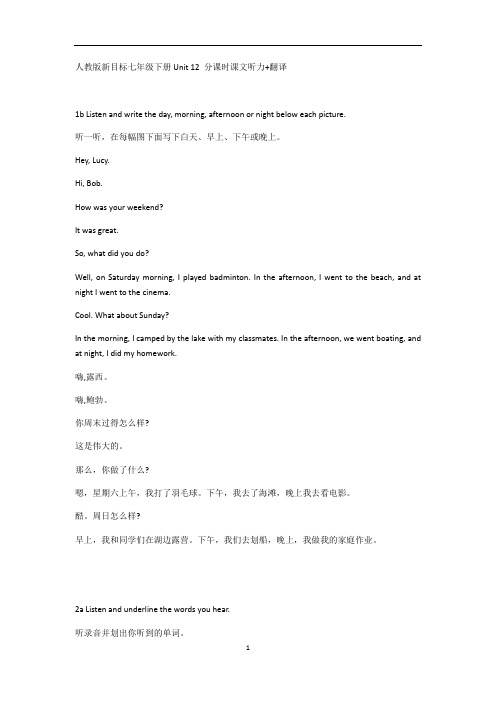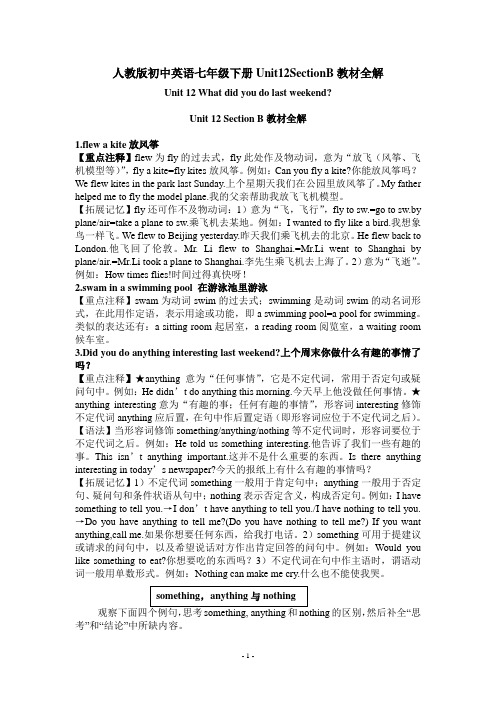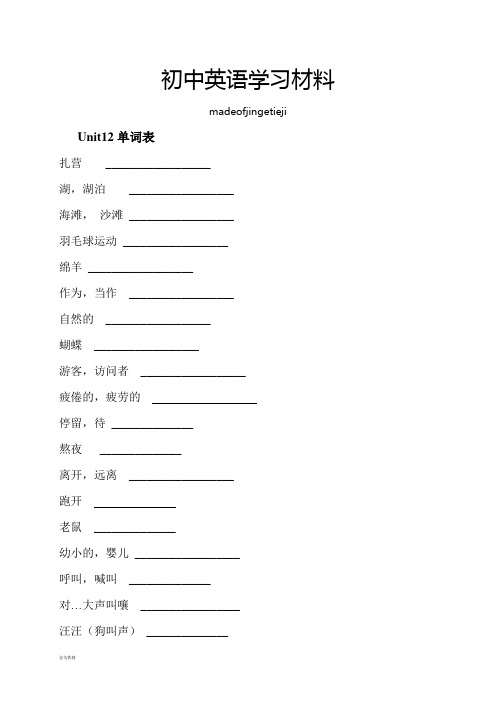新人教版初中英语七下unit12
初中英语 人教版七年级下册Unit 12 分课时课文听力+翻译

人教版新目标七年级下册Unit 12 分课时课文听力+翻译1b Listen and write the day, morning, afternoon or night below each picture.听一听,在每幅图下面写下白天、早上、下午或晚上。
Hey, Lucy.Hi, Bob.How was your weekend?It was great.So, what did you do?Well, on Saturday morning, I played badminton. In the afternoon, I went to the beach, and at night I went to the cinema.Cool. What about Sunday?In the morning, I camped by the lake with my classmates. In the afternoon, we went boating, and at night, I did my homework.嗨,露西。
嗨,鲍勃。
你周末过得怎么样?这是伟大的。
那么,你做了什么?嗯,星期六上午,我打了羽毛球。
下午,我去了海滩,晚上我去看电影。
酷。
周日怎么样?早上,我和同学们在湖边露营。
下午,我们去划船,晚上,我做我的家庭作业。
2a Listen and underline the words you hear.听录音并划出你听到的单词。
So, did everyone have a good weekend?Yeah, we did, Ms. Clark!Good. What did you do last weekend, Becky?I visited my grandma, and I did my homework.Great. And how about you, Carol? Did you go out?No, I stayed at home. I studied for the English test.Wow, good for you. Jack, how about you? Where did you go?I went to a farm, and I fed some cows.Sounds like you had fun.大家周末过得好吗?是的,克拉克女士!好。
人教版七年级英语下册Unit12_单元主题思维导图

How did Paul feel about his weekend?
Paul’s weekend
Lisa’s weekend
i_n_te_r_e_s_t_in__g
______
Scary
They put up (2)_t_e_n_ts_.
They made a fire and cooked food on.
_G_r_e_a_t____.
对话篇-SectionA 2d
_S_h_e_w__o_rk_e_d__a_s_a_g_u_i_d_e_a_t_t_h_e_N__a_tu_r_a_l___ _H_is_t_o_r_y_M__u_s_e_u_m_.__.
It was _f_u_n__.
They have a butterfly house with over_2_0_0_ kinds of butterflies!
否定句 疑问句
be型
主语+ was not(wasn't)/were not(weren't)+其他
如:They weren’t hard-working last year. 去年他们学习不努力。
do型 主语+ did not(didn't)+动词原形+其他
如:I did not (didn’t) call him last night. 我昨晚没有给他打电话。
be型
Was/Were+主语+其他?
如:Were they hard-working last year? 去年他们学习努力吗?
do型
Did+主语+动词原形+其他?
如:Did you call him last night? 你昨晚给他打电话了吗?
人教版初中英语七年级下册Unit12SectionA教材全解

人教版初中英语七年级下册Unit12SectionA教材全解Unit 12 What did you do last weekend?Unit 12 Section A教材全解1.go boating去划船【重点注释】这是“go+doing”结构的短语,类似的还有:go swimming/fishing/shopping/skating/camping去游泳/钓鱼/购物/滑冰/野营。
2.camped by the lake在湖边野营【重点注释】①camp此处作不及物动词,意为“扎营,宿营”,常用短语go camping意为“去野营”,camp out意为“野营;露营”。
例如:We camped near the beach.我们靠近海滩宿营。
Where did you camp last night?昨晚你在哪里宿营了?They often go camping on summer holidays.他们经常在暑假去野营。
I went camping with my friends last Sunday.上星期日我和朋友们去露营了。
The students love camping out on summer holidays.学生们喜欢在暑假中露营。
【拓展记忆】camp还可作名词,意为“野营,营地“,可构成词组:summer camp夏令营,winter camp冬令营。
例句:Let’s go back to the camp.It’s getting dark.我们回营地吧。
天快黑了。
We had a good week at the camp.我们在营地过了愉快的一周。
Did you go to summer camp last year?去年你参加夏令营了吗?②by the lake在湖边,by此处是介词,意为“在……旁边”、“在……近旁”、“在……手边”,此时要注意它与介词near有所不同,即by表示的距离更“近”。
最新人教版初中七年级英语下册Unit 12 第十二单元课件PPT

/d/
What did … do last …?
watch They watched TV last Sunday.
/t /
dance He danced last Saturday.
/t /
• A: You (1) look tired.
visit grandparents
What do they often do on weekends?
stay at home
What do they often do on weekends?
practice English
1a Match the activities with the pictures「a-f」.
What did they do last weekend?
have a school trip had a school trip have—had
have a big dinner had a big dinner
What did … do last weekend?
play computer games He played computer games last weekend.
_c__
1b Listen and write the day, morning, afternoon or night below each
picture.
1C Role-play. Student A is Lucy. Student B asks Lucy about her weekend.
• B: Yes. I had a (2) really busy weekend.
人教版初中英语七年级下册Unit12SectionB教材全解

人教版初中英语七年级下册Unit12SectionB教材全解Unit 12 What did you do last weekend?Unit 12 Section B教材全解1.flew a kite放风筝【重点注释】flew为fly的过去式,fly此处作及物动词,意为“放飞(风筝、飞机模型等)”,fly a kite=fly kites放风筝。
例如:Can you fly a kite?你能放风筝吗?We flew kites in the park last Sunday.上个星期天我们在公园里放风筝了。
My father helped me to fly the model plane.我的父亲帮助我放飞飞机模型。
【拓展记忆】fly还可作不及物动词:1)意为“飞,飞行”,fly to sw.=go to sw.by plane/air=take a plane to sw.乘飞机去某地。
例如:I wanted to fly like a bird.我想象鸟一样飞。
We flew to Beijing yesterday.昨天我们乘飞机去的北京。
He flew back to London.他飞回了伦敦。
Mr. Li flew to Shanghai.=Mr.Li went to Shanghai by plane/air.=Mr.Li took a plane to Shanghai.李先生乘飞机去上海了。
2)意为“飞逝”。
例如:How times flies!时间过得真快呀!2.swam in a swimming pool 在游泳池里游泳【重点注释】swam为动词swim的过去式;swimming是动词swim的动名词形式,在此用作定语,表示用途或功能,即a swimming pool=a pool for swimming。
类似的表达还有:a sitting room起居室,a reading room阅览室,a waiting room 候车室。
人教版七年级下册英语unit12单词

初中英语学习材料madeofjingetiejiUnit12单词表扎营__________________湖,湖泊__________________海滩,沙滩__________________羽毛球运动__________________绵羊__________________作为,当作__________________自然的__________________蝴蝶__________________游客,访问者__________________疲倦的,疲劳的停留,待______________熬夜______________离开,远离__________________跑开老鼠______________幼小的,婴儿__________________呼叫,喊叫______________对…大声叫嚷_________________汪汪(狗叫声)______________飞_________________风筝_________________放风筝高的(地)_________________中学_______________以前印度__________________帐篷__________________搭起,举起__________________月亮__________________惊奇,惊讶__________________吃惊__________________蛇__________________惊慌的,吓坏了__________________移动__________________对…大声喊叫__________________开始,着手跳,跃__________________上上下下__________________弄醒(及过去式)______(________)把…弄醒__________________耳朵__________________Unit12单词表扎营__________________湖,湖泊__________________ 海滩,沙滩__________________ 羽毛球运动__________________绵羊__________________作为,当作__________________ 自然的__________________蝴蝶__________________游客,访问者__________________ 疲倦的,疲劳的停留,待______________熬夜______________离开,远离__________________ 跑开老鼠______________幼小的,婴儿__________________ 呼叫,喊叫______________ 对…大声叫嚷_________________ 汪汪(狗叫声)______________飞_________________风筝_________________放风筝高的(地)_________________中学_______________以前印度__________________帐篷__________________搭起,举起__________________月亮__________________惊奇,惊讶__________________吃惊__________________蛇__________________惊慌的,吓坏了__________________移动__________________对…大声喊叫__________________开始,着手跳,跃__________________上上下下__________________弄醒(及过去式)______(________)把…弄醒__________________耳朵__________________。
人教版七下英语Unit12第4课时(SectionB 2a-2c)
When we looked out of our tent, we saw a big snake
sleeping near the fire. I was so scared that I couldn’t
v. 移动 对……大声喊叫 move. We shouted to our parents to let them know about
活动中心,家长可以根据孩子的性格特点和兴趣爱好, 有选择地让他们参加某项或某几项活动。
与中国的情况不同的是,美国孩子从12岁到法定 工作年龄之前,会在课余、周末或假期干些零活挣零 花钱。例如,女孩可以帮助亲朋或邻里照看小孩、打 扫卫生等;男孩则可以每天清晨把报纸送到各家各户 门口,也可以帮助街坊割草、装饰庭院等。这不仅能 让他们学会自己挣零花钱(pocket money),更能培养他 们的自立(independence)能力,提升他们的社交技巧 (social skills)。
lesson for me.
交代背景 Para.1
时间: last weekend 地点: India 人物: my parents, my sister and I 原因: my sister finished high school; as
a special gift 总结: Last weekend was interesting
3. What lesson did Lisa learn from the weekend? Snakes can’t hear but they can feel things moving.
Read about Lisa’s weekend and answer the questions. 1. When did Lisa’s sister finish high school? 2. How did they go there? 3. Why did Lisa go to sleep early? 4. How did Lisa feel when she saw the snake? 5. What did Lisa and her sister do? 6. What did their parents do? Why did they do that?
人教版七下英语Unit12第1课时(SectionA 1a-2d)
Carol stayed at home, studied for the English test
Jack went to a farm, fed some cows
2a Listen and underline the words you hear. 1. _B__ I visited my (aunt/ grandma). 2. ___ I did (my homework/ sports). 3. ___ I studied for the (English/ math) test. 4. ___ I went to a (farm/ beach). 5. ___ I fed some (sheep/cows).
Well, on Saturday morning, I played badminton.
1a Match the activities with the pictures [a-f]. 1. did my homework _a_ 2. went to the cinema _d_ 3. went boating _e_ 4. camped by the lake_f_ 5. went to the beach _b_ 6. played badminton _c_
the afternoon, I went to the beach, and at night, I went to the cinema.
Bob: Cool. What about Sunday? Lucy: In the morning, I camped by the lake with my
What did you do last weekend, Lucy?
Well, on Saturday morning, I played badminton.
人教版七下英语Unit12第3课时(SectionB 1a-1e)
helped buy
shouted swim study see
shout bought help have talked
talk
give gave saw
do ran studied
Work in groups of four or more and make sentences as the model.
Sally: Wow! You had a relaxing time! Jim: Yeah, I had fun. But I didn’t do my homework, so
school this morning wasn’t fun!
Disappearing dialogue.
Jim: Hey, Sally! I didn’t see you last weekend. Sally: Yeah. I stayed at home on Saturday. I was quite busy. Jim: Why? Sally: I had a lot of things to do. Jim: Like what? Sally: Well, I did my homework and studied for a test. Jim: You did? Not much fun, huh?
Because he didn’t do his homework.
Listen and read. Jim: Hey, Sally! I didn’t see you last weekend. Sally: Yeah. I stayed at home on Saturday. I was quite busy. Jim: Why? Sally: I had a lot of things to do. Jim: Like what? Sally: Well, I did my homework and studied for a test. Jim: You did? Not much fun, huh? Sally: Well, it wasn’t too bad. On Sunday, I went to the
人教版初中七年级英语下册第十二单元Unit12教案含教学反思
⼈教版初中七年级英语下册第⼗⼆单元Unit12教案含教学反思第11单元How was your school trip?类别课程标准要求掌握的内容话题School trips 学校旅游Section A 单词milk v.挤奶cow n.奶⽜horse n.马feed v.喂养;饲养farmer n.农民;农场主quite adv.相当;完全anything pron.任何东西;任何事物grow v.种植;⽣长;发育farm n.农场v.务农;种⽥pick v.采;摘excellent adj.极好的; 优秀的countryside n.乡村;农村yesterday adv.昨天flower n.花worry v.& n.担⼼;担忧luckily adv.幸运地;好运地sun n.太阳短语milk a cow给奶⽜挤奶ride a horse 骑马feed chickens 喂鸡quite a lot (of…)许多in the countryside 在乡下;在农村show sb. around…带领某⼈参观……last week上个星期go fishing 去钓鱼句型1.—How was your school trip?你的学校郊游怎么样?—It was great! 好极了!2.—Did you go to the zoo?你去动物园了吗?语法⼀般过去时(⼀)写作介绍过去的活动知识⽬标⼀般过去时态(I)能⼒⽬标能⼒⽬标能够听懂⽤⼀般过去时表达的句⼦;能够和别⼈谈论过去发⽣的事情,正确使⽤⼀般过去时;能够读懂含有⼀般过去时的句⼦的⽂章;学会使⽤⼀般过去时进⾏简单的写作。
情感⽬标能够谈论⾃⼰的郊游经历,感受⽣活的乐趣。
【课时建议】本单元建议5课时Section A (1a~2d)………………………………………………………………………………………1课时Section A (3a~3b)……………………………………………………………………………………1课时Section B (1a~1d)……………………………………………………………………………………1课时Section B (2a~2c)……………………………………………………………………………………1课时Section B (3a~3c)……………………………………………………………………………………1课时词汇短语:主要采⽤图⽚及多媒体展⽰助记法。
- 1、下载文档前请自行甄别文档内容的完整性,平台不提供额外的编辑、内容补充、找答案等附加服务。
- 2、"仅部分预览"的文档,不可在线预览部分如存在完整性等问题,可反馈申请退款(可完整预览的文档不适用该条件!)。
- 3、如文档侵犯您的权益,请联系客服反馈,我们会尽快为您处理(人工客服工作时间:9:00-18:30)。
I stayed up late to watch the soccer game.
Paul: Hi, Lisa. How was your weekend?
Lisa: Great. Thanks.
2d
Paul: What did you do?
Lisa: I worked as a guide at the Natural History
Did you have a good weekend?
Paul: Yeah, it was good, but I’m kind of tired now. I
stayed up late to watch the soccer game.
1. sheep 名词,意为“绵羊”。它是单复 数同形的单词,当它作主语时谓语动词 的单复数形式要根据它在句中的意思来 确定。类似的单词还有deer (鹿), Chinese (中国人)等。例如: Look, there are three sheep eating grass under the tree. 看! 树下有三只羊在吃草。
with over 200 kinds of butterflies! I told the
visitorsabout them and their living habits .
Did you have a good weekend?
Paul: Yeah, it was good, but I’m kind of tired now.
Museum.
Paul: Really? How interesting!
Lisa: Yeah, it was fun. They have a butterfly house
with over 200 kinds of butterflies! I told the
visitors about them and their living habits.
the afternoon. And I _s_t_a_y_e_d_ _u_p_ late to do my _h_o_m__e_w_o_r_k_ last night.
阅读Grammar Focus部分,完成 下列句子。 1. 上个周末你做什么了?
W__h_a_t__d_id__y_o_u__d_o_l_a_st__w_e_e_k_e_n_d_?_ 2. 我做了我的家庭作业。
_I_d_i_d_m__y__h_o_m_e_w__o_r_k_.
3. 我们去划船了。_W_e__w_e_n_t_b__o_a_ti_n_g_. 4. 谁去探望了她的奶奶?
_W__h_o_v_i_s_it_e_d_h__er__g_r_a_n_d_m__a_? 5. 是蓓基?_B_e_c_k_y__d_id_. 6. 上个周末她去了哪里?
language 意为“语言”,是可数名词。如: 英语、汉语、法语是三种不同的语言。 English, Chinese and French are three different languages. shout at “冲......大声叫嚷”,后面要跟人 或事物。如: 不要朝孩子们大声喊叫。 Don’t shout at the children.
Learning important and difficult points: 1.继续学习一般过去时态。 2.区分有趣和无趣的活动;对事件进行评价。 3.根据文章找寻关键信息,提高阅读能力。 4.能用所学知识介绍自己丰富多彩的上周末 生活。
5.理解较长文章,用所学知识对过去的事情 进行准确的表达,并写出完整的文章. 6.学会用一般过去时写作,提高写作能力。
8. kind of
有点儿
9. stay up late
熬夜
10. run away
跑开
11. shout at 12. fly a kite 13. high school 14. put up 15. in the countryside 16. get a surprise 17. make a fire 18. each other 19. so… that… 20. go to sleep
The cat quickly _r_a_n__a_w_a_y_. “Wow, Dad, you’re good!” _sa__id_ Baby Mouse. “Well, son, that’s why
it’s important to learn a second language,” answered Father Mouse.
对……大声叫嚷 放风筝 中学 搭起,举起 在乡下 吃惊 生火 互相 如此……以至于…… 入睡
• 21. the next morning 22. look out of…
• 23. shout to 24. up and down
• 25. wake…up • 26. move into…
27. a swimming pool
2d
Paul: What did you do
?
Lisa: I worked as a guide at the Natural History
Museum.
Paul: Really? How interesting
!
Lisa: Yeah, it was fun. They have a butterfly house
9. 她和她的同学们一起去的。 _S_h_e_w__e_n_t_w_i_t_h_h_e_r__cl_a_s_s_m_a_t_e_s_. __
3b say be climb see run away
A family of mice were in the kitchen on Saturday morning when they _s_a_w_ a big cat. Baby Mouse _w_e_r_e_ afraid and _cl_i_m_b_e_d_ onto his father’s back. Father Mouse shouted at the cat, “Woof, woof!”
What did you do last weekend?
复习课件
Section A
Learning important and difficult points: 1.进一步学习过去时态的用法。 2.继续学习谈论过去事件;学会用疑问词 who,what,when,并能学以致用。
Section B
• 如此……以至于……
• 6. see sb. doing sth. 看见某人正在做某事
• 7. let sb. do sth.
让某人做某事
• 8. start to do / doing sth. 开始做某事
Paul: Hi, Lisa. How was your weekend?
Lisa: Great. Thanks.
3. How interesting! 多么有趣啊! 这是一个感叹句,句子结构为: How + 形容词或副词 + (主语 + 谓 语)! 例如: How interesting the book is! 那本书太有趣了!
4. They have a butterfly house with over 200 kinds of butterflies! 句中的with是介词,意为“有;带有”。 如:
Who is the girl with long blonde hair? 那位金色长发的女孩 是谁?
句中的kind是名词,意为“种;类”, 是可数名词。如:
There are three kinds of fruits on the table. 桌子上有三种水果。
【链接】与kind有关的短语有: a kind of “一种;某种(不明确的东西)”, kind of “有点”,many / different / all kinds of “各种各样的”。
_W__h_e_re__d_id__s_h_e_g_o__la_s_t_w__e_e_k_e__w__e_n_t_t_o_t_h_e_f_a_r_m_.__________
8. 她和谁一起去的? W__h_o__d_i_d_s_h_e__g_o_w_i_t_h_?__________
the library. _图__书__馆__里__有__五__种__书__。_______________
(3) My uncle bought a house with a
big garden. _我__叔__叔__买__了__一__幢__带__有__大__花__园__的__房__子__。_
5. I stayed up late to watch the soccer game. stay up 意为“熬夜;深夜不眠” 。例如: Don’t stay up late. It’s bad for your health. 不要熬夜,这对你的健康不好。
短语归纳
1. do my homework
做我的家庭作业
2. go to cinema
去看电影
3. go boating / camping 去划船 / 去野营
4. play badminton
打羽毛球
5. on Saturday morning 在星期六早上
6. work as
以……身份而工作
7. have a good weekend 周末过得愉快
Let’s stay up to see the New Year. 咱们别睡觉,迎接新年的到来吧。
— Hi, Li Lei. _H_o_w__ _w_a_s_ your weekend? — Not bad. I _w_e_n_t_ _to__ the farm, and _sa_w__ a
